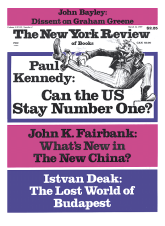Lee Atwater, the Republican party’s new national chairman, has told The Wall Street Journal that his first exercise will be to reach out to the minorities. President George Bush won 10 percent of the voters of color last November. In Atwater’s judgment, the Republicans have only to double that figure “to become the majority party through the millennium.”
He is embarking upon an effort that appears small as a hope and even smaller as a necessity. To have allienated 90 percent of the black electorate may well give a governing party reason for shame. But it is meager cause for alarm in the presentidal flow. History seems to be running with the Republicans, and Atwater may be all they need to accelerate its pace.
There are probably several good things about Lee Atwater, but it is his plain bad ones that fit him for his job. He incarnates the Mean Country South (MCS). His spirit draws its force from those lines in “Black Mountain Blues” about being “bound for Black Mountain with my razor and my gun / Gonna cut him if he stands still and shoot him if he run.”
Black Mountain was a mythical settlement to which strong men of color repaired to escape reprisal for conduct too unsettling for precincts more sedate. Its immortality was established in the black blues tradition, but the Mean Country South has always been an interracial establishment.
White MCS had been until lately the poliltical property of Democrats. Lyndon Johnson had more than a trace of it. Senator John McClellan (D-Ark.) embodied it and Representative Jack Brooks of Texas radiates it still. The southern Republicans have never until now been up to it, although Strom Thurmond, just by being peevish, used to pick up a few unearned points from observers unfamiliar with the real thing. But Atwater is MCS in bone and sinew.
It is an in-no-way-unexpected irony that this master at capturing white fears should be himself in permanent thrall to the black style, indifferent to rock and roll and rooted in the rhythm and blues that was its source. It is his particular prideful memory that, when he played guitar in high school in South Carolina, he now and then served as backup for Percy Sledge. (At the inaugural, he put on a rhythm and blues evening, to which the President came.)
The blues came up in a conversation that was not, so to say, going swimmingly several weeks ago, when Atwater looked at me as if I was about to pay my respects to Buddy Holl. But then I made references of profounder cultural deeps. His wariness gave way to community, and we commenced to rejoice in an otherwise nonexistent mutuality of taste until he said that the blues for him was the Chicago School and he didn’t mean George Shultz and Milton Friedman.
The Chicago blues? That’s the rawest stuff still available on the planet. Set a rapper next to artists this fierce and you’d think he was singing madrigals. To confront them in full cry means to teeter continually between gratification and alarm for the skin. I have seen drummers among them who were fortunate not to have been mistakenly identified as Willie Horton.
No one needs to apologize for placing Chicago blues at the heart of his aesthetic sensibilities. Still it might seem an odd taste in the political craftsman who used the image of Willie Horton to frighten so much of the electorate out of what wits had previously been as its disposal.
It is not, of course, odd at all. If you took away his deeds of darkness and restored him to a preceriminal condition, you would have a Willie Horton with the walk and talk that bespeak MCS and call out to Lee Atwater as brother to brother.
And so, true to his nature, Atwater took this image of what he most cherishes and waved it like a bloody shirt before a constituency that, since its members are so unlike him, was guaranteed to hate it. Running against your inner self is the ultimate refinement for a politician. But even so, Lee Atwater must sometimes feel lonely when he gazes down upon the Republican National Committee assembled at his call.
This Issue
March 16, 1989



